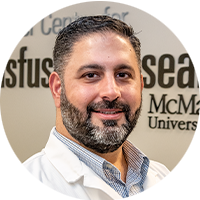Studies in the CITF Databank

Determining long-term immune protection in COVID-19 patients
Ishac Nazy, McMaster University
This study aims to identify how the immune system responds to SARS-CoV-2 by examining different elements of the immune response, including antibodies and T cells that attack the virus, as well as immune memory B and T cells responsible for long-term protection from the virus.
Research summary Results Lab website View study on 

Detecting SARS-CoV-2 antibodies using inexpensive home blood collection kits
Keith Jarvi, Sinai Health System
This study is using a group of healthcare workers to develop and validate a home blood collection kit that will be used with a fully automated antibody testing platform.
Research summary Results Study website View study on 

COVID-19 Vaccination and Community Protection: A Cohort Study in Hutterite Colonies
Mark Loeb, McMaster University
This study investigates the extent to which COVID-19 vaccination interrupts transmission of SARS-CoV-2 within communities. The research team is following Hutterite colony members in three provinces for 18 months to understand the levels of COVID-19 vaccination required to achieve protection and assessing the impact of the various vaccines that have been administered.
Research summary Results Study website View study on 

THE Ku-gaa-gii pimitizi STUDY: HOMELESSNESS AND COVID-19 (formerly COVENANT Study)
Stephen Hwang, Unity Health Toronto
The Ku-gaa-gii pimitizi Study is gathering in-depth information on COVID-19 among people experiencing homelessness in Toronto, which has Canada’s largest homeless population.
Research summary Results Study website View study on 




Long-term care residents: Studying immune response to COVID-19 and developing an early warning system for outbreaks
Xiaoli (Lilly) Pang and Chris Sikora, University of Alberta
This study is examining how the immune systems of residents and staff in long-term care facilities in Alberta react to COVID-19 infection and to vaccines. Monitoring will be done via blood samples and sewage wastewater.
Research summary Results Study website View study on 

COVID-19 Vaccination among People Living with HIV: Immunogenicity, Effectiveness, and Safety
Aslam Anis, University of British Columbia
COVID-19 may pose a greater risk to people living with HIV. This study is following 400 people living with HIV in Montreal, Ottawa, Toronto, and Vancouver to determine their COVID-19 immune responses. Researchers are also doing a population-based analysis of provincial public health to look at vaccine effectiveness in people living with HIV.
Research summary Results Study website View study on 

Prospective Evaluation of COVID-19 Vaccine in Transplant Recipients (PREVenT-COVID): A National Strategy
Deepali Kumar, University Health Network
This study is following more than 600 transplant recipients from several high-volume transplant centres in Canada over a two-year period to test the safety and effectiveness of COVID-19 vaccines in this immunosuppressed population. To assess long-term safety, researchers are developing a national safety surveillance system of COVID-19 vaccination amongst transplant recipients through the CANVAS network.
Research summary Results Study website View study on 

Prospective Cohort Study to Examine Immunogenicity of SARS-CoV-2 Vaccination in Cancer Patients with Solid Malignancies
Glenwood Goss, Ottawa Hospital Research Institute
This study is investigating whether cancer patients can develop an immune system response to COVID-19 vaccines and is looking to provide critical information on the effectiveness of vaccines for people with cancer.
Research summary Results Study website View study on 

Saskatchewan SARS-CoV-2 Seroprevalence Protocol (Phase I/Retrospective- lab analysis only)
Maureen Anderson, University of Saskatchewan
This study aims to understand what proportion of the population in Saskatchewan has immunity to SARS-CoV-2 by geographic area, age group and sex, in order to establish the cumulative population immunity. Researchers are also examining how long immunity lasts and helping to target vaccination campaigns.
Research summary Results Study website View study on 

Surveying prospective population cohorts for COVID19 prevalence and outcomes in Canada (SUPPORT-Canada)
Philip Awadalla, Canadian Partnership for Tomorrow’s Health (CanPath)
Building on Canadian Partnership for Tomorrow’s Health (CanPath), a national population health research platform that follows the health of 330,000 Canadians, SUPPORT-Canada aims to capture data and biologics to help researchers and clinicians determine the factors that contribute to COVID-19 susceptibility and severity.
Research summary Results Study website View study on 

Manitoba COVID Seroprevalence Study (MCS Study)
Derek Stein, University of Manitoba
This study will take blood samples from Manitobans every two to three months to provide up-to-date estimates of COVID-19 prevalence. It will measure seroprevalence in the general population in Manitoba by sex, age, and regional health authority, determine risk factors for infection and improve estimates of case fatality ratio.
Research summary Results Study website View study on 

The serologic prevalence of SARS-CoV-2 amongst incarcerated persons in provincial correctional facilities in Saskatchewan
Alexander Wong, University of Saskatechewan
This study aim is to measure the prevalence of SARS-CoV-2 antibodies among incarcerated individuals in Regina, Saskatchewan.
Research summary Results Study website View study on 

Action to beat Coronavirus in Canada (Ab‐C Study)
Prabhat Jha, Unity Health Toronto
Using dried blood spot (DBS) samples from about 10,000 randomly selected adults from across Canada taken at two separate intervals, the Action to Beat Coronavirus (Ab-C Study) aims to increase understanding of the durability of immunity against SARS-CoV-2 reinfection.
Research summary Results Study website View study on 




Evaluating the safety and immunogenicity of SARS-CoV-2 vaccines among underserved urban populations with intersecting risk factors for COVID-19 morbidity and mortality: a pooled analysis of three prospective cohort studies in Vancouver, Canada
Hudson Reddon and Brittany Barker, University of British Columbia
Urban centres are home to people from vulnerable populations (those suffering from homelessness, living in group settings, high-intensity substance use and having other infectious diseases such as HIV) who have increased risk factors for catching SARS-CoV-2 and developing serious cases of COVID-19. In this study, researchers are evaluating the uptake, safety and effectiveness of COVID-19 vaccines in these groups.
Research summary Results Study website View study on 

Measuring the prevalence of COVID-19 among Quebec food workers
Denis Boudreau, Université Laval
This study aims to shed light on how many food industry workers have been exposed to the virus and what their immune responses are.
Research summary Results Study website View study on 

Studying paramedics’ risk of exposure to COVID-19
Brian Grunau, University of British Columbia
The study aims to follow 5,000 paramedics from British Columbia and Ontario to examine COVID-19 risk factors, infection, and immunity; this includes paramedics who have already been vaccinated.
Research summary Results Study website View study on 




Monitoring hotspots for COVID-19 among University of Waterloo students
Brian Dixon and Marc Aucoin, University of Waterloo
This study of students, faculty and staff at the University of Waterloo and other nearby post-secondary institutions aims to demonstrate which groups on a university campus are more at risk for catching SARS-CoV-2, and the factors that increase risk of exposure.
Research summary Results Study website View study on 




Tracking COVID to inform interventions and help make our schools safer
Pascal Lavoie and Louise Mâsse, University of British Columbia
This study is evaluating a group of staff and students in the Vancouver School District to determine how many have previously been infected with COVID-19. Researchers are determining the risk of exposure to the virus in schools, and the effects of the pandemic on participants’ mental health.
Research summary Results Study website View study on 

Ontario food workers: determining the prevalence of COVID-19 to help stop transmission
Amit Oza, University Health Network
Using asymptomatic testing, this study aims to better understand the transmission of SARS-CoV-2 in food industry settings. This study focuses specifically on employees at several food production facilities in the Greater Toronto Area.
Research summary Results Study website View study on 

IPAC+ evaluating intervention impact using serological and cellular assays as correlates of SARS-CoV-2 exposure among long-term care homes (LTCH) staff, residents, and transmission networks
Sharon Straus, Unity Health Toronto
This study aims to understand the different aspects of immunity for long-term care residents and workers as well as their response to vaccines.
Research summary Results Study website View study on 

Determining the impact of COVID-19 vaccines on long-term care residents
Marc Romney, Providence Health Care / University of British Columbia
The study examines how the immune systems of older residents and staff in long-term care facilities in British Columbia respond to COVID-19 vaccination. Researchers will also assess the viral, immunological and social factors that have contributed to COVID-19 outbreaks in long-term care facilities to better understand why the disease has been fatal to so many residents.
Research summary Results Study website View study on 

Safety and Efficacy of Preventative COVID Vaccines (STOPCoV)
Sharon Walmsley, University Health Network
STOPCoV is comparing how people aged 70 and over respond to COVID-19 vaccines compared to younger people aged 30 to 50. They are looking at demographics, underlying illness, medication taken, and other factors. Once people are eligible for a third dose, the team will continue to follow participants to determine antibody responses to that third dose.
Research summary Results Study website View study on 

Canadian Longitudinal Study on Aging (CLSA): Platform for studying the epidemiology of the COVID-19 pandemic in aging populations (CLSA COVID-19 Study)
Parminder Raina, McMaster University
Building on the Canadian Longitudinal Study on Aging (CLSA), a national research platform with more than 50,000 individuals, the CLSA COVID-19 Antibody Study aims to collect and analyze blood samples from more than 19,000 CLSA participants in 10 provinces in order to estimate how widespread SARS-CoV-2 is among older adults by province, age, and sex.
Research summary Results Study website View study on 

The EnCORE Study: How many children and teens in Montreal have been infected with SARS-CoV-2?
Kate Zinszer, Université de Montréal
The EnCORE Study is a research project estimating how many young people in Montreal have been infected with SARS-CoV-2. Specifically, they are studying 2- to 17-year-olds in daycares, elementary schools, and high schools randomly selected in four Montreal neighbourhoods.
Research summary Results Study website View study on 

Seroprevalence of SARS-CoV-2 among African Canadians: Clinical and Epidemiological Correlates
Upton Allen, Hospital for Sick Children (SickKids) Research Institute
In this study, researchers will follow people of African ancestry in Ontario to determine how many have had COVID-19 and to establish the risk factors associated with getting the infection as well as having poor outcomes, including hospitalization and death.
Research summary Results Study website View study on 
Ishac Nazy
Ishac Nazy, PhD
Associate Professor, Department of Medicine, Faculty of Health Sciences, McMaster University
Scientific Director of the McMaster Platelet Immunology Laboratory
Key words
SARS-CoV-2
COVID-19
Immunology
Immunity
Protection
Antibodies
Memory cells
Viral elimination
Research interests
My research interests include the immune response against infectious diseases and in autoimmunity. Specifically, we study different branches of the immune response, including antibodies and memory cells, that are involved in providing long-term protection against infections but also lead to severe blood disorders when the immune system over-reacts and causes autoimmune diseases.
Publications:
Bhalla A, Mukherjee M, Radford K, Nazy I, Kjarsgaard M, Bowdish DME, et al. Dupilumab, severe asthma airway responses, and SARS-CoV-2 serology. Allergy. 2020;6. DOI: https://doi.org/10.1111/all.14534
Determining long-term immune protection in COVID-19 patients
Our study is identifying how the immune system responds to SARS-CoV-2 by examining different elements of the immune response, including antibodies and T cells that attack the virus, as well as immune memory B and T cells responsible for long-term protection from the virus.
We are identifying patients who have developed an immune response and then testing for their ability to eliminate the SARS-CoV-2 virus. We are also determining if recovered COVID-19 patients have developed immune memory cells capable of fighting future infections. We will also compare short- and long-term immune responses to infection versus vaccination.
Findings from our study will:
- Accurately identify COVID-19 patients by detecting who developed an immune response;
- Identify individuals with antibody responses capable of eliminating the SARS-CoV-2 virus;
- Determine if there is immune memory against SARS-CoV-2 that could protect against re-infection; and
- Determine the effectiveness of people’s long-term immune protection from infection and from vaccination.
Ultimately, a better understanding of the immune response to SARS-CoV-2 will help us fight the current COVID-19 pandemic and prepare us for future pandemics.
Results: COVID-19 infection, antibody responses, and immunity in at-risk individuals
Keith Jarvi
Professor of Surgery, University of Toronto
Clinician Scientist, Lunenfeld-Tanenbaum Research Institute
Physician, Division of Urology, Sinai Health
Chief, Division of Urology, Mount Sinai Hospital
Key words
COVID-19 antibodies
Rapid testing
COVID-19 immunity
Capillary blood sampling
Research interests
Development of high throughput testing capacity
Duration of COVID-19 immunity following infections and vaccinations
Health Care Worker risks of COVID-19 infection (HealthyHCW study)
Detecting SARS-CoV-2 antibodies using inexpensive home blood collection kits
There is an urgent need for population-wide serologic testing, both to diagnose past SARS-CoV-2 infections (by detecting antibodies in blood) and to determine if immunity to COVID-19 is long-lasting. While healthcare workers are particularly at risk of contracting COVID-19, as front-line caregivers, rates of previous infections are sparsely reported. For this reason, healthcare workers were invited to participate in the study.
Our study is developing and validating a home blood collection kit that will be used with a fully automated antibody testing platform. The aim is to create a “high throughput” (10,000 tests/day in one centre), inexpensive (less than $15/test), accurate, and easy-to-use procedure for SARS-CoV-2 antibody detection.
Our study began with an initial pilot study of 100 volunteers (including a minimum of 25 who have recovered from COVID-19) — to identify home blood collection kits that were convenient to use and that maintained the accuracy of the antibody testing platform, providing the optimum laboratory performance.
We then selected one home blood collection kit for a larger group of 1,500 healthcare workers to test and identify any issues with blood collection or testing. Our goal is to develop an accurate, inexpensive, and easy-to-use antibody test that can be rapidly available to large populations of Canadians.
Our volunteers are performing antibody tests three, six, nine, 12 and 18 months following an initial testing, in addition to a post-vaccination sample for volunteers who get vaccinated. This provides further information on the prevalence of past SARS-CoV-2 infections, the incidence of new infections, if immunity (as indicated by SARS-CoV-2 antibodies) is present and durable, and a measurement of vaccine effectiveness in healthcare workers.
We will also monitor the volunteers on their vaccination status, the effectiveness of the vaccines, their antibody responses, and any new COVID-19 symptoms or infections following vaccination.
Mark Loeb, MD
Professor, Department of Pathology and Molecular Medicine, and Department of Health Research Methods, Evidence, and Impact, McMaster University
Medical Microbiologist and Infectious Disease Physician
Contact info
loebm@mcmaster.ca
Key words
Clinical trials
Cohort study
Hutterite
Vaccination
Community transmission
Research interests
Randomized trials
COVID-19
Influenza
Determinants of COVID-19 Community Transmission: Learning from the Hutterites
Achieving a better understanding of how COVID-19 vaccination can protect entire communities is one of the most important challenges facing governments both in Canada and worldwide. This is best studied in entire communities, and to do this, it is critical to understand the role of indirect protection or herd effect on community transmission, taking into account the role of pre-existing immunity.
Prospective cohort studies of COVID-19 where members of multiple entire cities or towns are enrolled are usually not feasible, however our study is following several Hutterite colonies. Most Hutterites live in Alberta, Saskatchewan, and Manitoba where they practice communal farming on small colonies relatively isolated from towns and cities. Within these homogeneous, moderately-sized colonies, the communal lifestyle facilitates regular transmission of respiratory viruses. Our study aims to understand the impact of COVID-19 vaccination on community COVID-19 transmission in Hutterite colonies in Alberta and Saskatchewan.
We are following Hutterite colony members for a total of eighteen months. We are collecting blood samples for antibody testing and obtaining regular nasal swab samples for COVID-19 testing. We are also recording the instance of COVID-19 vaccination among participants, and using statistical modeling to understand the levels of COVID-19 vaccination required to achieve protection in the Hutterite colonies and assessing the impact of the various vaccines that have been administered. Finally, our study will help understand the transmission of new SARS-CoV-2 variants of concern, including Omicron, in Hutterite communities.
Findings from this cohort study will inform policy makers about the extent to which COVID-19 vaccination interrupts transmission of the virus within communities.
Xiaoli (Lilly) Pang
Professor, Department of Laboratory Medicine and Pathology, Investigator, Li Ka Shing Institute of Virology, University of Alberta
Molecular Virologist, Alberta Precision Laboratories
Program Leader, Alberta Precision Laboratories
Principal investigator, Li Ka Shing Institute of Virology – University of Alberta
Contact info
Xiao-li.Pang@albertapresicionlabs.ca
Key words
Virology
gastroenteric viruses
norovirus
rotavirus
environmental virology
diagnostics
infectious diseases
SARS-CoV-2
Research interests
Human viral gastroenteritis: etiology and diagnosis of enteric viruses (norovirus, rotavirus, sapovirus, astrovirus, and enteric adenovirus)
Epochal evolution of norovirus associated with epidemic gastroenteritis and its relationship with host susceptibility and herd immunity
Environmental virology and microbiology
Diagnosis of human viruses (CMV, EBV, BKV) infection in solid-organ transplantation recipient
Wastewater-based epidemiology on SARS-CoV-2 surveillance in wastewater
Chris Sikora
Associate Clinical Professor, Division of Preventive Medicine, Faculty of Medicine & Dentistry, University of Alberta, Edmonton, Alberta
Medical Officer of Health, Alberta Health Services, Edmonton Zone
Contact info
chris.sikora@ahs.ca
Key words
public health
prevention
health systems
immunization
Research interests
Public health
health systems
immunization
communicable disease
respiratory disease
Long-term care residents: Studying immune response to COVID-19 and developing an early warning system for outbreaks
Our study is examining how the immune systems of residents and staff in long-term care facilities in Alberta react to COVID-19 infection and to vaccines. Using blood samples, we are comparing the response of people who have previously been infected with COVID-19 to those who were not infected. Our study will provide important information about the impact of vaccines in this population group.
We are also monitoring sewage wastewater near long-term care facilities in Edmonton for the presence of SARS-CoV-2 RNA to develop an early warning system to detect and monitor outbreaks. Studies conducted elsewhere in the world have identified the COVID-19 virus in human wastewater before people nearby show signs of illness. Detecting the virus this way provides an early sign that the virus is circulating. The goal will be to combine an early warning system with a quick public health response including rapid testing of residents and staff to stop outbreaks and prevent further spread of the disease within the facility.
Ultimately, our research study aims to decrease the illness burden of COVID-19 outbreaks in this vulnerable population.
Results: Long-term care residents: Studying immune response to COVID-19 and developing an early warning system for outbreaks
Stephen Hwang
Professor, Department of Medicine, Temerty Faculty of Medicine, University of Toronto
Staff Physician, General Internal Medicine, Unity Health Toronto, St. Michael’s Hospital
Director, MAP Centre for Urban Health Solutions, Unity Health Toronto, St. Michael’s Hospital
Contact info
stephen.hwang@unityhealth.to
Key words
COVID-19 pandemic
SARS-CoV-2
Homelessness
Cohort study
Public health
Research interests
Social determinants of health
Homelessness and homeless people
Access to care
Health services research
Population and public health
THE Ku-gaa-gii pimitizi STUDY: HOMELESSNESS AND COVID-19 (formerly COVENANT Study)
More than 235,000 Canadians experience homelessness every year. Shelters are an ideal environment for transmission of COVID-19, due to crowding, shared space, and high turnover. People who are homeless may also have chronic health conditions that increase the risk of poor outcomes if they develop COVID-19.
The Ku-gaa-gii pimitizi Study (formerly the COVENANT Study) is gathering in-depth information on COVID-19 infections among people experiencing homelessness in Toronto, which has Canada’s largest homeless population. About 7,000 individuals stay in shelters in Toronto each night, and rates of infection have been more than 20 times higher than in the non-institutionalized general population.
Our researchers are following approximately 700 people experiencing homelessness over the course of a year. We are testing for current and past SARS-CoV-2 infections, recording participants’ symptoms, and asking about their interactions with the healthcare and shelter systems to further our understanding of potential risk factors. Administrative data will also be collected to validate self-reported information. This high-quality, real-time data will build a computer simulation model that can make accurate projections of COVID-19 transmission in this population, as well as evaluate the potential impact of interventions aimed at reducing transmission.
We will also monitor vaccine uptake and the reasons for vaccine hesitancy through a qualitative sub-study that will follow-up up to 40 people from the main cohort. This will contextualize the epidemiological data collected and better inform public health decision makers about what these populations need in a crisis.
The Ku-gaa-gii pimitizi study will help reduce the impact on our health care system and better inform public health measures across Canada. Those measures could include prioritizing people experiencing homelessness for vaccination; implementing repeated screening of the homeless population (rather than one-time screening); creating smaller shelter facilities; and placing high-risk individuals in temporary housing. Our ultimate goal is to detect, control, and prevent COVID-19 in this high-risk, disadvantaged population.
THE Ku-gaa-gii pimitizi STUDY: HOMELESSNESS AND COVID-19 (formerly COVENANT Study)
Aslam Anis
Aslam Anis
Professor and Director pro tem, School of Population and Public Health, University of British Columbia
Director, Centre for Health Evaluation and Outcome Sciences
National Director, CIHR Canadian HIV Trials Network
Contact info
aslam.anis@ubc.ca
Key words
Health economics, HIV/AIDS, pharmaceuticals drugs, public health
Research interests
Pharmaceutical pricing and pharmaceutical industry regulations
Economic evaluation and economic decision analysis of health care interventions
Treatment cost-effectiveness and access
COVID-19 Vaccination among People Living with HIV: Immunogenicity, Effectiveness, and Safety
The first part of this study, called COVID-19 Vaccination among People Living with HIV: Immunogenicity, Effectiveness, and Safety, is following 400 people living with HIV in Montreal, Ottawa, Toronto, and Vancouver to determine their COVID-19 immune responses post-vaccine doses including third or fourth doses. Researchers are evaluating how well participants’ antibodies fight off the SARS-CoV-2 virus which causes COVID-19 and the durability and effectiveness of antibody response post-third vaccine dose. They are also comparing the data for this group with the immune responses from a control group of 100 people who do not have HIV.
The second part of this study involves a population-based analysis of provincial public health records in Ontario and British Columbia to look at vaccine effectiveness including third and fourth doses in people living with HIV compared to people who do not have HIV. Researchers are following more than 35,000 people living with HIV to note COVID-19 vaccine uptake and rates of SARS-CoV-2 infection and hospitalization. This includes looking at age, sex, where people live, socioeconomic status, comorbidities, HIV immune status, and the number of vaccine doses to see if these play a role in the effectiveness of COVID-19 vaccines.
The study results will provide important evidence to inform vaccination guidelines and public health strategies for the approximately 67,000 Canadians living with HIV.
Results: COVID-19 Vaccination among People Living with HIV: Immunogenicity, Effectiveness, and Safety
Deepali Kumar
Deepali Kumar MD, MSc, FRCPC, FAST
Professor of Medicine, University of Toronto
Transplant Infectious Diseases Consultant, University Health Network
Director of Transplant Infectious Diseases, University Health Network
Key words
Vaccine
Immunology
Cell-mediated immunity
Emerging diseases
Serology
Research interests
Immune response to vaccines in transplant recipients
Immune response to viruses in transplant recipients
Epidemiology of emerging infectious diseases in transplantation
Donor-derived infections
Publications
Humoral and Cellular immune response and Safety of 2-dose SARS-CoV-2 mRNA-1273 (Moderna) vaccine in Solid Organ Transplant Recipients. Victoria G. Hall, Victor H. Ferreira, Matthew Ierullo, Terrance Ku, Tina Marinelli, Beata Majchrzak-Kita, Anila Yousuf, Vathany Kulasingam, Atul Humar, Deepali Kumar. American Journal of Transplantation (in press).
Paucisymptomatic COVID-19 in lung transplant recipient following two doses of mRNA-1273 (Moderna) vaccine. Marinelli T, Chaparro C, Humar A, Kumar D.J Heart Lung Transplant. 2021 Jun 23:S1053-2498(21)02358-5. doi: 10.1016/j.healun.2021.06.007. Online ahead of print.PMID: 34274181 No abstract available.
Prospective Clinical, Virologic, and Immunologic Assessment of COVID-19 in Transplant Recipients. Marinelli T, Ferreira VH, Ierullo M, Ku T, Lilly L, Kim SJ, Schiff J, Sidhu A, McDonald M, Hosseini-Moghaddam SM, Husain S, Rotstein C, Majchrzak-Kita B, Kulasingam V, Humar A, Kumar D.Transplantation. 2021 Jun 18. doi: 10.1097/TP.0000000000003860. Online ahead of print.PMID: 34149003
A call to routinely test lower respiratory tract samples for SARS-CoV-2 in lung donors. Kumar D, Humar A, Keshavjee S, Cypel M.Am J Transplant. 2021 Jul;21(7):2623-2624. doi: 10.1111/ajt.16576. Epub 2021 Apr 1.PMID: 33756058 Free PMC article. No abstract available.
Prospective observational study and serosurvey of SARS-CoV-2 infection in asymptomatic healthcare workers at a Canadian tertiary care center. Ferreira VH, Chruscinski A, Kulasingam V, Pugh TJ, Dus T, Wouters B, Oza A, Ierullo M, Ku T, Majchrzak-Kita B, Humar ST, Bahinskaya I, Pinzon N, Zhang J, Heisler LE, Krzyzanowski PM, Lam B, Lungu IM, Manase D, Pace KM, Mashouri P, Brudno M, Garrels M, Mazzulli T, Cybulsky M, Humar A, Kumar D.PLoS One. 2021 Feb 16;16(2):e0247258. doi: 10.1371/journal.pone.0247258. eCollection 2021.PMID: 33592074
COVID-19: A global transplant perspective on successfully navigating a pandemic. Kumar D, Manuel O, Natori Y, Egawa H, Grossi P, Han SH, Fernández-Ruiz M, Humar A.Am J Transplant. 2020 Jul;20(7):1773-1779. doi: 10.1111/ajt.15876. Epub 2020 Apr 12.PMID: 32202064
Prospective Evaluation of COVID-19 Vaccine in Transplant Recipients (PREVenT-COVID): A National Strategy
People who have undergone a solid organ transplant or a stem cell transplant are at greater risk for severe COVID-19 disease due to their life-long immunosuppression, a factor which may also reduce their immune response to COVID-19 vaccines. In Canada, we are well positioned to investigate the safety and effectiveness of vaccines in people who have had transplants because of well-established transplantation and vaccination networks for research and knowledge-sharing, and high-quality research and laboratory capabilities. This research group has extensive clinical trials experience in evaluating other vaccines, such as those for influenza and HPV, in transplant recipients and our national partner network provides results to public health decision makers, patients and their families.
Our study, called PRospective Evaluation of COVID-19 Vaccine in Transplant Recipients (PREVenT-COVID): A National Strategy, is following more than 600 transplant recipients from several high-volume transplant centres over a two-year period to test the safety and effectiveness of COVID-19 vaccines. We are taking blood samples at multiple time points to assess both short-term and long-term vaccine-induced immune responses: before vaccination, at three to four weeks after the first, second, third and possibly fourth dose, then at six months and one year after the last dose. We are also looking at data from other transplant patients who have already been infected with COVID-19 to compare their antibody response.
The study results will be communicated to transplant patients and their advocacy and support groups, research organizations and public health agencies to provide important and ongoing information on vaccine safety in transplant recipients.
Results: Prospective Evaluation od COVID-19 Vaccine in Transplant Recipients (PREVenT-COVID): A National Strategy
Glenwood Goss
Glenwood Goss
Professor, University of Ottawa
Medical Oncologist, The Ottawa Hospital
Contact info
ggoss@toh.ca
Key words
Lung cancer
Cancer
IND
Phase 1
Clinical research
Translational research
Biomarkers
Medical oncology
Research interests
Lung cancer
Phase 1
Early drug development
Clinical research
Prospective Cohort Study to Examine Immunogenicity of SARS-CoV-2 Vaccination in Cancer Patients with Solid Malignancies
The large clinical trials of COVID-19 vaccines did not include individuals with compromised immune systems such as people with cancer, so there is limited safety data on the use of the vaccines in this group. In addition, many cancer patients have weakened immune systems due to their disease or because of treatments such as radiation and chemotherapy, which may reduce their immune response to vaccines. For these reasons, it is essential to determine if cancer patients develop sufficient immune response after COVID-19 vaccination.
Our study, called Prospective Cohort Study to Examine Immunogenicity of SARS-CoV-2 Vaccination in Cancer Patients with Solid Malignancies, brings together researchers from the Ottawa Hospital Research Institute and BC Cancer. The primary objective of our study is to compare vaccine-induced immune responses in cancer patients vs. healthy participants. To that extent, we are following 200 participants and analyzing blood samples taken before vaccination and at various time points afterward. We are looking at participants’ antibody production, how well these antibodies neutralize the SARS-CoV-2 virus, and how well their immune systems recognize the virus and develop lasting immunity against it. Since the introduction of additional vaccine doses for cancer patients, we have updated our study protocol to follow patients after their third and possibly fourth dose, to match the reality of a shifting vaccination landscape. Where possible, we are combining this information with other outcomes of vaccine effectiveness, such as whether or not patients become infected with the SARS-CoV-2 virus even though they are vaccinated.
The results of our study will help determine if cancer patients are able to develop an immune system response to the vaccine, and provide critical information to patients, health care providers, public health authorities and regulatory agencies on the effectiveness of vaccines for people with cancer.
Maureen Anderson
Maureen Anderson, PhD
Assistant Professor, Department of Community Health and Epidemiology, College of Medicine, University of Saskatchewan
Technical Advisor, Public Health Surveillance, SK pandemic response
Contact info
Maureen.anderson@usask.ca
Key words
SARS-CoV-2; seroprevalence; duration of protection; vaccination; Delta; Saskatchewan
Research interests
Population and public health
Infectious disease epidemiology
Field epidemiology
Publications
Anderson M, Chhetri A, Halyk E, Lang A, McDonald R, Kryzanowski J, Minion J, Trecker M. An outbreak of COVID-19 in a fitness centre in Saskatchewan: Lessons for Prevention. Canadian Communicable Disease Report [accepted Sep 2021]
Trecker MA, Konrad S, Yalamanchili DT, Langhorst K, Anderson M. In-person learning low risk for COVID-19 acquisition: Findings from a population-based analysis of the 2020/21 school year in Saskatchewan. [submitted Oct 2021]
Saskatchewan SARS-CoV-2 Seroprevalence Protocol (Phase I/Retrospective- lab analysis only)
Our study team, which includes Maureen Anderson, Lesley Behl, Amanda Lang, Stephen Lee, Jessica Minion, and Cory Neudorf, is analyzing a total of 20,000 blood serum samples collected for screening purposes in Saskatchewan from May to December 2020 (prior to vaccine administration), and from October 2021 to at least June 2022 (following and coinciding with vaccine delivery). The study’s primary objective is to understand what proportion of the population in Saskatchewan has immunity to the virus by geographic area, age group and sex, in order to establish the cumulative population immunity.
The study’s secondary objectives include:
- examining how long protection lasts at a population level by analyzing antibody titre levels and length of time since vaccination,
- helping target vaccination to areas of the province with lower estimates of population immunity,
- comparing provincial population immunity before and after COVID-19 vaccination roll-out, and before and after variants of concern are identified in the population, and
- estimating the proportion of vaccine-induced immunity in the population versus infection-acquired immunity.
At the time when this study started, in the fall of 2021, not much information was available about how antibodies wane over time following vaccination. By collecting residual serum samples, conducting qualitative and quantitative testing for antibody levels, and then linking samples to patient COVID-19 immunization history, we will be able to assess seroprevalence rates and the impact of vaccines on antibody levels.
We will provide data from our study to the COVID-19 Immunity Task Force, Saskatchewan Health Authority, and the Government of Saskatchewan. Data collected will indirectly benefit participants through an increased understanding of COVID-19 in the province.
Philip Awadalla
Philip Awadalla, PhD
Professor, Department of Molecular Genetics, Faculty of Medicine, University of Toronto
Professor, Division of Epidemiology, Dalla Lana School of Public Health, University of Toronto
Adjunct Professor, CHUM, Department of Medicine, Faculty of Medicine, University of Montreal
Director, Computational Biology, Ontario Institute for Cancer Research
Senior Investigator, Ontario Institute for Cancer Research
National Scientific Director, Canadian Partnership for Tomorrow’s Health (CanPath)
Executive Scientific Director, Ontario Health Study
Principal Investigator and Director, Genome Canada Canadian Data Integration Centre
Key words
Canadian Partnership for Tomorrow’s Health (CanPath), SUPPORT-Canada, Ontario Health Study, Serology, Immunity, COVID-prevalence, Genomics
Research interests
– Genomics
– Early Cancer Detection
– Quantitative and population genetics
– Precision medicine
– Cancer diagnostic markers development
– Big data and Machine Intelligence
Publications
– CPHA Webinar – CanPath COVID-19 Questionnaire Results: A Preliminary Analysis
– Ouellette TW, Shaw J, Awadalla P. Using image-based haplotype alignments to map global adaptation of SARS-CoV-2. 2021. Biorxiv (and in review)
Surveying prospective population cohorts for COVID19 prevalence and outcomes in Canada (SUPPORT-Canada)
Our large number of participants, pan-Canadian reach, and population coverage allow us to capture how age, sex, socio-demographic factors, geography, genetics, and health history can impact immune responses to COVID-19.
With data from a survey that we implemented in 2020, we are able to identify participants who may have been exposed as well as infected. We can also identify how pre-existing conditions, captured through health information routinely collected over the past decade, impact COVID-19 disease severity. This project also includes a seroprevalence study of 3,000 participants at three time points, which enables us to capture immunity signatures both pre- and post-vaccination. Identifying diagnosed and symptomatic participants within the population enables rapid surveillance that supports Canada’s public health agencies at the community and individual levels — and helps shed light on the unequal distribution of COVID-19 across the country.
This COVID-19-specific information also allows us to provide the scientific community with timely data to support research on surveillance, prevention, and risk factors.
Results: SUrveying Prospective Population cOhorts for COVID19 pRevalence and ouTcomes in Canada (SUPPORT-Canada)
Derek Stein
Derek Stein
Assistant Professor, University of Manitoba, Medical Microbiology and Infectious Diseases
Scientist, Cadham Provincial Laboratory
Contact info
Derek.Stein@gov.mb.ca
Key words
Serology
Seroprevalence
COVID-19
SARS-Cov-2
Research interests
SARS-CoV-2
Syphilis
STBBIs
Publications
Comparison of commercial assays and laboratory developed tests for detection of SARS-CoV-2, https://doi.org/10.1016/j.jviromet.2020.113970
Simulated sunlight decreases the viability of SARS-CoV-2 in mucus, https://doi.org/10.1371/journal.pone.0253068
Expansion of tissue-resident CD8+ T cells and CD4+ Th17 cells in the nasal mucosa following mRNA COVID-19 vaccination, bioRxiv
Dried blood spot specimens for SARS-CoV-2 antibody testing: A multi-site, multi-assay comparison, Research Square
Evaluation of commercial SARS-CoV-2 serological assays in Canadian public health laboratories, https://doi.org/10.1016/j.diagmicrobio.2021.115412
Practical guidance for clinical laboratories for SARS-CoV-2 serology testing, 10.14745/ccdr.v47i04a01
Manitoba COVID Seroprevalence Study (MCS Study)
Across Canada, many provincial governments and public health authorities have established seroprevalence studies to gather data on SARS-CoV-2 infections to better understand the extent of COVID-19 spread in their population and adapt public health measures accordingly.
In Manitoba, Cadham Provincial Laboratory (CPL) has initiated a surveillance study, called the Manitoba COVID Seroprevalence (MCS) study, to estimate the prevalence of COVID-19 within the province. The study is designed to sample the Manitoba population every two to three months in order to provide up-to-date estimates of COVID-19 prevalence.
This study is population based and includes people from all age groups, and follows World Health Organization (WHO) approved protocols for COVID-19 seroprevalence investigation. Our study objectives include:
- measuring the seroprevalence of SARS-CoV-2 antibodies in the general population in Manitoba by sex, age, and regional health authority;
- determining risk factors for infection by age, gender, and region;
- improving the estimates of case fatality ratio.
Our study is taking place over a two-year period, and we are analyzing more than 10,000 blood samples from people in all age categories (ages 1-9, 10-19, 20-39, 40-59, and 60+) from all of Manitoba’s six regional health authorities.
This prevalence study will allow public health officials to estimate the number of undiagnosed infections in Manitoba and determine the proportion of the population that is susceptible to COVID-19 disease. The study results will ultimately allow officials to implement public health policies in response to changing trends over time.
Prabhat Jha
Professor of Global Health, University of Toronto
Unity Health Toronto
Scientist
Contact
Prabhat.jha@utoronto.ca
Key words
Epidemiology
Research interests
Epidemiology
Action to beat Coronavirus in Canada (Ab‐C Study)
Looking at past infection from the SARS-CoV-2 virus can help determine the spread of the disease in the general population and quantify levels of population immunity. Our study, the Action to Beat Coronavirus (Ab-C Study), involves asking randomly selected adults from across Canada (through the Angus Reid Institute) to collect their own dried blood spot (DBS) samples, which they then mail to our central lab for rigorous testing to see if they have antibodies to the virus from past infection or vaccination.
Phase 1 of our study, completed in June 2020, documented the first COVID-19 wave across Canada and indicated that about two per cent of Canadians were seropositive. We also asked participants about their symptoms, demographics, and employment.
In Phase 2, which began early 2021, we repeated the DBS collection and survey with a group of approximately 7,200 participants and determined that seropositivity was still low.
In a sub-study, a pilot group of participants, including those with a positive antibody test in the initial phase, were asked to take part in a more detailed study of their antibody responses. In addition to collecting a DBS sample, they contributed a fresh blood sample (collected by a lab professional in their homes or in hospital). These were analyzed for a broad array of immune responses in specialized laboratory tests.
In Phase 3, we collected samples from about 6,000 participants in the summer of 2021. A substantial antibody response to vaccination was observed, on top of earlier infection-induced antibodies.
Phase 4 was timed around early 2022 to coincide with the peak of the Omicron-fuelled fifth wave. It covers approximately 6,000 participants. Phase 5 rolls-out later in 2022 and involves about 5,500 participants. Similar to earlier phases, Phases 4 and 5 will quantify the persistence of antibodies and relate these to survey and serology data in relation to number of doses, brand of vaccine, vaccination dates, spacing, and other predictors. We also aim to evaluate differences in antibody response by identifiable demographic and risk groups, and how these relate to the Omicron-relevant outcomes. A final aim of the study is to pilot test a low-cost, home-based DBS collection system that can be used in large-scale antibody studies in Canada and around the world.
Results: Action to beat Coronavirus in Canada (Ab‐C Study)
Brittany Barker
Brittany Barker
Research Scientist, BC Centre on Substance Use, Providence Health Care
Postdoctoral Fellow, Department of Medicine, University of British Columbia
Collaborating Scientist, Canadian Institute of Substance Use Research, University of Victoria
Health Surveillance Overdose Response Researcher, First Nations Health Authority
Contact info
bccsu-bb@bccsu.ubc.ca
Key words
Vaccine effectiveness
Immunogenicity
Cohort studies
People who use drugs/substance use
Epidemiology
Research interests
Community-based participatory research with people with lived/living experience
Health system policy and program evaluations
Harm reduction and health equity-focused research
Indigenous health research and decolonization
Youth in the child welfare system
Publications
Nosyk B, Slaunwhite A, Urbanoski K…Barker B…Pauly B. (2021). Evaluation of risk mitigation measures for people with substance use disorders to address the dual public health crises of COVID-19 and overdose in British Columbia: A mixed-methods study protocol. BMJ Open, 11(6):e048353. doi: 10.1136/bmjopen-2020-048353
Hudson Reddon
Hudson Reddon
Postdoctoral Research Fellow
Department of Medicine, University of British Columbia
BC Centre on Substance Use
Contact info
hudson.reddon@bccsu.ubc.ca
Key words
Vaccine effectiveness
Immunogenicity
Vaccine uptake
People who use drugs
HIV
Research interests
Infectious diseases
HIV
Substance use
Epidemiology
Evaluating the safety and immunogenicity of SARS-CoV-2 vaccines among underserved urban populations with intersecting risk factors for COVID-19 morbidity and mortality: a pooled analysis of three prospective cohort studies in Vancouver, Canada
This research project, called Evaluating the safety and immunogenicity of SARS-CoV-2 vaccines among underserved urban populations with intersecting risk factors for COVID-19 morbidity and mortality: a pooled analysis of three prospective cohort studies in Vancouver, Canada, is looking at these issues among participants of three community-based studies (VIDUS, ACCESS and ARYS) in Vancouver which follow people who use unregulated drugs; these studies have a strong track record of following this population since 2005. The objectives include:
- Analyzing the effectiveness of COVID-19 vaccines and comparing data among specific groups (e.g. people who are homeless, people who live with HIV) within structurally vulnerable populations;
- Evaluating how long vaccines are effective against infection;
- Assessing vaccine uptake and if people adhere to vaccination protocols; and
- Investigating potential side effects from the vaccines.
To accomplish this, researchers are collecting and analyzing blood samples and interview data from the three studies, and they are asking participants to take part in an initial visit as well as three follow-up visits over six months to gather additional information.
This research is being conducted in partnership with people with living experience. The findings are being shared with community and public health partners and will contribute to providing real-word data to evaluate vaccines in vulnerable and hard-to-reach populations.
Alexander Wong
Alexander Wong, MD, FRCPC
Assistant Professor, Division of Infectious Diseases, University of Saskatchewan
Infectious Diseases Specialist at Saskatchewan Health Authority
Contact info
alexander.wong@usask.ca
Key words
Infectious diseases
COVID-19
HIV
viral hepatitis (B & C) research
persons who inject or use drugs
persons with addictions
persons who are incarcerated
Research interests
COVID-19
HIV
Viral hepatitis (B & C)
Addictions medicine
Marginalized populations
The serologic prevalence of SARS-CoV-2 amongst incarcerated persons in provincial correctional facilities in Saskatchewan
Correctional facilities have significant movement of incarcerated individuals in and out at any given time, and within provincial facilities the number and turnover of incarcerated individuals is higher than in federal facilities. In general, incarcerated individuals suffer from social and economic vulnerabilities which place them at higher risk for SARS-CoV-2 infection and transmission. Understanding how many people in correctional facilities have had COVID-19 and where infections may have occurred can contribute to more effective prevention strategies and inform vaccine planning.
Our aim is to measure the prevalence of SARS-CoV-2 antibodies among incarcerated individuals in Regina, Saskatchewan. We are following 400 participants, and will determine how many have been exposed to SARS-CoV-2, and identify the socioeconomic and housing insecurity issues associated with an increased incidence of COVID-19 among these individuals. We are also asking participants if they have received a COVID-19 vaccine.
The stigma of having a positive COVID-19 antibody test in a correctional facility is considerable, so we are making significant efforts to ensure that results remain confidential. Ensuring informed consent, privacy and fairness are of utmost importance, and we are prioritizing community stakeholder engagement in the research project including working with a representative family and advisory group to inform our research.
Our work will benefit the participants by informing them of their SARS-CoV-2 status and will also contribute to the federal and provincial studies simultaneously underway to understand the extent of previous SARS-CoV-2 infection in correctional settings. This work may also serve as a surrogate for the degree of SARS-CoV-2 antibody prevalence in similar populations outside of correctional settings.
Denis Boudreau
Principal Investigator
Full Professor, Department of Chemistry, Université Laval
Key words
Biosensors
Nanoparticles
Fluorescence
Plasmonics
Research interests
Analytical chemistry
Biosensors
Optical instrumentation
Microfluidics
Nanoscience and nanotechnology
Optical spectroscopy
Publications
Djaileb, A.; Charron, B.; Jodaylami, M. H.; Thibault, V.; Coutu, J.; Stevenson, K.; Forest, S.; Live, L. S.; Boudreau, D.; Pelletier, J.; Masson, J. ChemRxiv 2020, https://doi.org/10.26434/chemrxiv.12118914.v1.
Measuring the prevalence of COVID-19 among Quebec food workers
Food industry employees are deemed essential workers since they support services necessary to the health and well-being of the public. Many food industry staff have been working in front-facing jobs throughout the pandemic and are at higher risk of being exposed to COVID-19 because of their close daily contact with large numbers of people. There are still limited data on how many workers have been exposed to the virus and what their immune responses are, and our study aims to shed light on these issues.
We are following 300 participants over time: people who work in grocery stores, restaurants, and bars in the Capitale-Nationale and Chaudière-Appalaches regions in Quebec, as well as a group of hardware store employees for comparison purposes. Through initial blood tests, we are determining who has COVID-19 immunity, suggesting a previous infection.
We take blood samples again at three and six months to test for those who have become infected or vaccinated over time. Part of our study involves looking for correlations between people’s immune response and the factors that may contribute to severe cases of COVID-19. Initial blood tests are taken pre-vaccination and participants who receive a COVID-19 vaccine during the study continue to be followed. Six researchers—Denis Boudreau, Sylvie Trottier, Caroline Gilbert, Jean-François Masson, Joelle Pelletier and Mariana Baz—from Université de Montréal and Université Laval are involved in the project.”
Results: Measuring the prevalence of COVID-19 among Quebec food workers
Brian Dixon
Professor and Canada Research Chair, University of Waterloo
Contact info
bdixon@uwaterloo.ca
Key words
Immunology
Antibody
Assay
disease
Research interests
Development of immune assays
Immune response to disease
Evolution of immunity
Publications
Dijkstra JM, Frenette AP and Dixon B. Most Japanese individuals are genetically predisposed to recognize an immunogenic protein fragment shared between COVID-19 and common cold coronaviruses. F1000Research 2021, 10:196 https://doi.org/10.12688/f1000research.51479.1
Dixon, B., Barreda, D. and Sunyer, O. Perspective on the development and validation of Ab reagents to fish immune proteins for the correct assessment of immune function. Frontiers in Immunology 9: 2957 (2018). DOI: 10.3389/fimmu.2018.02957
Monitoring hotspots for COVID-19 among University of Waterloo students
At the start of the COVID-19 pandemic, Canadian universities quickly moved to holding most teaching activities online to limit gatherings in class and on campus. Since, most students are back in school. Nonetheless, since the beginning of the pandemic, some students have been at risk as they attend in-person classes, live in residence or near campus, and come and go from campus every term, either returning home or, if enrolled in co-op programs, going to work in another city altogether. Our study of students, faculty and staff at the University of Waterloo and other local post-secondary institutions aims to demonstrate which groups on a university campus are more at risk for catching the SARS-CoV-2 virus, and the factors that increase risk of exposure.
At Waterloo, there were several cases on campus in 2020, despite the majority of classes being online. The campus is a diverse environment with many international students, and our study includes a variety of people of different sexes, blood groups, age groups, and races who are exposed to similar levels of risk in approximately the same environment. We aim to enroll 1,000 students, faculty, and staff who are providing several blood samples so we can track their exposure to the SARS-CoV-2 virus, and their immunity to it.
Our study is being conducted in conjunction with Waterloo Region hospitals and the results of our research will provide the University of Waterloo and local health authorities key knowledge on the location and spread of COVID-19 which may help them adjust their response to the pandemic as needed. Our work will also add to the body of knowledge for other universities, health authorities and stakeholders in the country about the spread of COVID-19 on campuses.
Results: Monitoring hotspots for COVID-19 among University of Waterloo students
Marc Aucoin
Professor, Department of Chemical Engineering, University of Waterloo
Chair, Department of Chemical Engineering, University of Waterloo
Contact info
maucoin@uwaterloo.ca
Key words
antibody production
virus production
vaccine manufacturing
recombinant protein production
Research interests
Control of biological systems
Publications
Walji S-D, Aucoin MG. A critical evaluation of current protocols for self-sterilizing surfaces designed to reduce viral nosocomial infections, American Journal of Infection Control, Volume 48, Issue 10, 2020, Pages 1255-1260
Logan M, Manalil J, Notte C, Kearse C, George S, Zeiser A, Farrell P, Aucoin MG. A flow cytometric granularity assay for the quantification of infectious virus (2019) Vaccine 8;37(47):7090-7099
Meunier SM, Sasges MR, Aucoin MG. Evaluating ultraviolet sensitivity of adventitious agents in biopharmaceutical manufacturing (2017) Journal of Industrial Microbiology and Biotechnology, 44 (6), pp. 893-909.
Blondeel EJM, Braasch K, McGill T, Chang D, Engel C, Spearman M, Butler M, Aucoin MG. Tuning a MAb glycan profile in cell culture: Supplementing N-acetylglucosamine to favour G0 glycans without compromising productivity and cell growth (2015) Journal of Biotechnology, 214, pp. 105-112.
Brian Grunau
Professor, Department of Emergency Medicine, University of British Columbia
Emergency Physician, St. Paul’s Hospital
Scientist, Centre for Health Evaluation and Outcome Sciences
Contact info
Brian.Grunau@ubc.ca
Research interests
Resuscitation
cardiac arrest
prehospital medical care and guidelines
Publications
https://pubmed.ncbi.nlm.nih.gov/?term=grunau+b%5Bauthor%5D
Studying paramedics’ risk of exposure to COVID-19
Paramedics are essential workers instrumental to helping Canadians get through the pandemic. They are likely at high risk for contracting COVID-19 but little is known about which tasks they perform are associated with a greater risk of exposure. Paramedics treat people who potentially have COVID-19, and their work involves providing care in close proximity and transporting patients in confined spaces often with limited ventilation. They also routinely provide emergency medical treatments, such as CPR for cardiac arrest, which may increase the risk of transmission.
Our study aims to enrol up to 5,000 paramedics from British Columbia, Ontario, Saskatchewan, Alberta, and Manitoba to examine COVID-19 risk factors, infection, vaccination strategies, and immunity. This includes both paramedics who have, and have not, been vaccinated. Participants are providing blood samples four times over the course of two years.
We are using these samples to measure both infection-induced and vaccine-acquired antibodies. Additionally, we are comparing vaccination strategies (including the type of vaccine, intervals between doses, and use of subsequent vaccine doses) with antibody concentrations and neutralizing capabilities against variants of concern (VOCs) and comparing them to the wild type (Wuhan strain). Looking at blood samples from paramedics who test positive, we will examine the longevity of antibodies over the course of the study to provide information on how long antibodies may contribute to a person’s immune response and their neutralization capabilities against VOCs.
Our study is also investigating workplace factors that may increase a paramedic’s exposure to infection with the goal of providing evidence to inform safe work practices. For example, administering certain treatments, like those that generate aerosols, may benefit from specific workplace infection control strategies. By comparing differing practices, we will identify optimal strategies. Once our study is complete, the results will provide evidence to inform workplace health and safety guidelines aimed at protecting paramedics from becoming infected with SARS-CoV-2.
Results: Studying paramedics’ risk of exposure to COVID-19
Louise Mâsse
Professor, BC Children’s Hospital Research Institute, School of Population and Public Health, University of British Columbia
Contact info
lmasse@bcchr.ubc.ca
Key words
Seropositivity, Exposure, School, Mental health, Health behaviours, Vaccine receptivity
Research interests
Exposure and viral transmissions in schools
Receptivity to COVID-19 vaccine
Impact of COVID-19 on mental health and health behaviours
Publications
Choi, A., Mâsse, L.C., Bardwell, S., Kayda, I., Zhao, Y., Zi, Y.X., Markarian, A., Coombs, D., Macdonald, A., Watts, A.W., Dhillon, N., Irvine, M., O’Reilly, Lavoie, P.M., & Goldfard, D.M. (In press) Symptomatic and asymptomatic transmission of SARS-CoV-2 in K-12 schools, British Columbia, Canada April to June 2021. Microbiology Spectrum. https://journals.asm.org/doi/full/10.1128/spectrum.00622-22 Co-SA
Goldfarb, D.M., Mâsse, L.C., Watts, A.W., Hutchison, S.M., Muttucomaroe, L., Bosman, E.S., Barakauskas, V.E., Choi, A., Irvine, M.A., Reicherz, F., Coombs, D., O’Reilly, C., Sediqi, S., Razzaghian, H.R., Sadarangani, M., O’Brien, S.F., & Lavoie, P.M. (2022) SARS-CoV-2 seroprevalence among Vancouver public school staff in British Columbia, Canada: A cross-sectional study. BMJ Open;12:e057846. doi:10.1136/ bmjopen-2021-057846. Co-SA
Hutchison, S.M., Watts, A., Gadermann, A., Oberle, E., Oberlander, T.F., Lavoie, P.M., & Mâsse, L.C. (2022) Elevated levels of anxiety and psychological distress among Vancouver school staff in 2021. Journal of Affective Disorders Reports, April 8: 100335. doi: 10.1016/j.jadr.2022.100335 SA
Watts, W.W., Hutchison, S.M., Bettinger, J.A., Gadermann, E.O., Oberlander. T.F., Goldfarb, D.M., Lavoie, P.M., & Mâsse, L.C. (2022). COVID-19 Vaccine intentions and perceptions among public school staff of the greater Vancouver metropolitan area, British Columbia, Canada. Frontiers in Public Health
Public Health Education and Promotion, 10, 83244. https://doi.org/10.3389/fpubh.2022.832444. SA
Pascal Lavoie
Pascal Lavoie
Associate Professor, University of British Columbia
Neonatologist, BC Women’s Hospital
Clinician-Scientist, BC Children’s Hospital Research Institute
Contact info
604-875-2135
Key words
Human immunology, Pediatric, Health, Cohort studies
Research interests
– Development of the human, neonatal immune system
– Immunity to common respiratory infections in infants
– Neonatal sepsis biomarkers
– COVID-19 immunity and viral transmission in schools
– Population immunity and cross-reactivity to SARS-CoV-2
Publications
https://pubmed.ncbi.nlm.nih.gov/?term=lavoie%20PM%20and%20covid&sort=date
Tracking COVID to inform interventions and help make our schools safer
While many businesses and other organizations in Canada have had work-from-home policies throughout the pandemic, primary and secondary schools have largely reopened for in-class activities. The goal of reopening has been to give children the best options for their education and well-being, but it has also meant increased risk for teachers and other school workers of contracting COVID-19. As well, the protective measures implemented may place significant stress on the school community.
Our study is evaluating a group of staff and students in the Vancouver School District to determine how many have previously been infected with COVID-19. We are determining the risk of exposure to the virus in schools, and the effects of the pandemic on participants’ mental health. We are also monitoring vaccine uptake among teachers, to determine how many agree to be vaccinated and whether antibodies are detected in their blood after vaccination.
Study participants are providing blood samples which we test for antibodies to the virus to determine how many people have been exposed to COVID-19 without their knowledge. This allows us to estimate the level of virus transmission within the school setting compared to the community at large. When a staff member or student tests positive for COVID-19, we are testing their close contacts for COVID-19 with a mouth rinse gargle test that was first evaluated and implemented at BC Children’s Hospital.
Our research results will contribute to the development of further interventions and policies to make schools as safe as possible for educators, students and their families.
Results: Tracking COVID to inform interventions and help make our schools safer
Amit Oza
Professor, Faculty of Medicine, University of Toronto
Head, Division of Medical Oncology & Hematology, University Health Network and Sinai Health System
Medical Director, Cancer Clinical Research Unit
Co-Director, Bras Family New Drug Development Program
Senior Scientist
Princess Margaret Cancer Centre
Contact info
amit.oza@uhn.ca
Key words
Cancer
Gynecology
Medical oncology
Clinical trials
Translational research
Research interests
Early phase translational clinical trials
Novel clinical trial design
Precision therapy
A research platform to screen and protect individuals that work within a food production, healthcare, research or clinical organization – RESPECT
Our research focuses on employees at several food production facilities in the Greater Toronto Area. We are testing people with no symptoms to see if they have COVID-19. We are taking blood samples from participants over time to get a clearer picture of how antibodies to COVID-19 evolve and how this can influence transmission of the disease. We inform those people who test positive, as well as their employer and the local public health authority to ensure proper infection control measures are in place at the workplace. We are also assessing our participants’ vaccine uptake and their development of an immune response to withstand COVID-19.
Our study is part of a larger project called “A Research Platform to Screen and Protect Individuals that Work within a Food Production, Healthcare, Research or Clinical Organization (RESPECT)”.
Marc Romney
Marc Romney, MD, FRCPC, DTM&H
Clinical Professor, University of British Columbia
Head, Medical Microbiology and Virology, St. Paul’s Hospital/Providence Health Care
Contact info
mromney@providencehealth.bc.ca
Publications
https://pubmed.ncbi.nlm.nih.gov/?term=romney+mg
Determining the impact of COVID-19 vaccines on long-term care residents
Residents of long-term care facilities are at increased risk for serious outcomes from COVID-19, and vaccination programs are a vital step in protecting this vulnerable population. Understanding how effective vaccines are for the elderly, how quickly their immune responses develop, and how long immunity lasts is crucial to inform the best use of vaccinations.
Our study is looking at how the immune systems of elderly residents and staff in long-term care facilities in British Columbia respond to COVID-19 vaccination. Our researchers will also assess the viral, immunological, and social factors that have contributed to COVID-19 outbreaks in long-term care facilities to better understand why the disease has been fatal to so many residents.
We have collected blood samples from residents and staff at a number of long-term care facilities, before they were vaccinated whenever possible, then taking more blood samples periodically after vaccination. We will analyze their vaccine-induced immunity over time using innovative laboratory tests to understand how much protection is provided and how it changes over time. We are also taking into account which vaccine participants received, and when they got their subsequent doses , to determine vaccine effectiveness at different dosing intervals.
Our study also involves looking at blood samples collected from a long-term care residence that experienced an outbreak early in the pandemic to understand why it was so much worse for some residents than for others.
What we learn in this study will help provide the evidence needed to develop the best possible protection for people who live and work in long-term care facilities, and hopefully save lives.
RESULTS: DETERMINING THE IMPACT OF COVID-19 VACCINES ON LONG-TERM CARE RESIDENTS
Sharon Straus
Sharon E. Straus
Professor, Department of Medicine, University of Toronto
Physician-in-Chief, St. Michael’s Hospital-Unity Health Toronto
Director, Knowledge Translation Program, St. Michael’s
Contact info
Sharon.straus@utoronto.ca
Key words
Geriatric medicine
implementation science and practice
mentorship
Research interests
Advancing the science and practice of evidence implementation to improve patient care and wellbeing and strengthen the health system
Advancing methods for engaging patients and other knowledge users in research
Publications
https://wellness-hub.ca
IPAC+ evaluating intervention impact using serological and cellular assays as correlates of SARS-CoV-2 exposure among long-term care homes (LTCH) staff, residents, and transmission networks
Residents of long-term care facilities are particularly vulnerable to COVID-19 because of factors such as advanced age, weaker immune systems, or other health conditions. Staff in these facilities are also at a greater risk for contracting COVID-19 than the community at large. Understanding different aspects of immunity for long-term care residents and workers as well as their response to vaccines will help provide important information to protect against serious outbreaks in the future.
Our study is looking at people in 72 long-term care facilities in Southwestern Ontario and the Ottawa-Champlain region. Through saliva and blood samples, we are determining how many participants have already had COVID-19, whether they showed symptoms or not, and the impact of the vaccine on immune response. We are looking at factors related to the residence as a whole, as well as the individual, to determine what immune-response levels are associated with a previous infection or prevention of that infection. We are also looking at participants’ immune system response after receiving a COVID-19 vaccine.
Our research also extends to the essential care partners of residents, and the household members of the long-term care workers to understand how a person’s “bubble” may affect their risk of infection. We are also looking at wastewater testing near certain long-term care homes and in high-risk communities to see if it can help identify outbreaks sooner.
Working with 40 partners nationally, we are also developing an intervention plan with tools such as town halls, vaccine infographics and support services that will enhance staff wellness and encourage infection prevention best practices and vaccine implementation, including addressing vaccine acceptance. We have also tailored this intervention to offer support to 15 emergency shelter sites, as many of the challenges faced by long-term care facilities are also shared by other congregate settings, such as shelters.
RESULTS: IPAC+ EVALUATING INTERVENTION IMPACT USING SEROLOGICAL AND CELLULAR ASSAYS AS CORRELATES OF SARS-COV-2 EXPOSURE AMONG LONG-TERM CARE HOMES (LTCH) STAFF, RESIDENTS, AND TRANSMISSION NETWORKS
Sharon Walmsley
Sharon Walmsley
Professor of Medicine, University of Toronto
Infectious Diseases Consultant, University Health Network
Director Immunodeficiency Clinic, University Health Network
Senior Scientist, Toronto General Hospital Research Institute
Contact info
Sharon.walmsley@uhn.ca
Key words
COVID
Vaccine
Elderly
Immunity
Dried blood spots
Research interests
HIV
Women’s health
Infections in elderly
Safety and Efficacy of Preventative COVID Vaccines (STOPCoV)
COVID-19 vaccines were rapidly approved for use and considered an extremely important step towards ending the pandemic. However, since most participants in the vaccine clinical trials were Caucasian with an average age of 50 and little underlying illness, more information is needed about how well the vaccines work in older persons, and in more diverse populations. Our study, STOPCoV, is following more than 1,300 people living in Ontario. Within this group, we are comparing how people aged 70 and over respond to COVID-19 vaccines compared to younger people aged 30 to 50.
Our study, called Safety and Efficacy of Preventative COVID Vaccines (STOPCoV), requires participants to complete on-line questionnaires about their demographics, any underlying illness, medications they take, and any prior COVID-19 diagnosis, and they keep a seven-day diary of symptoms and reactions after each COVID-19 vaccine dose. We are also measuring the levels of antibodies or proteins in older individuals to see how well they respond to the vaccine and to follow the levels over time.
Since more Canadians of all ages will likely become eligible for a “booster” dose, we are planning another phase of our study to determine antibody response to a third vaccine dose. For those participants who receive a third dose, we are measuring their antibody levels for an additional year, as well as asking them to keep another seven-day diary to record any side effects after the third dose.
We are also looking at the impact of race, gender, and underlying illnesses such as diabetes, high blood pressure, heart, liver or kidney disease on vaccine safety and effectiveness. Our research results will be shared with public health officials.
Results: Safety and Efficacy of Preventative COVID Vaccines (STOPCoV)
Parminder Raina
Professor, Department of Health Research Methods, Evidence, and Impact, McMaster University
Lead Principal Investigator, Canadian Longitudinal Study on Aging
Scientific Director, McMaster Institute for Research on Aging
Scientific Director, Labarge Centre for Mobility in Aging
Raymond and Margaret Labarge Chair in Optimal Aging and Knowledge Application for Optimal Aging
Canada Research Chair in GeroScience
Key words
Canadian Longitudinal Study on Aging (CLSA)
Étude longitudinale canadienne sur le vieillissement (ELCV)
Epidemiology
Population health
COVID-19
Geroscience
Research interests
Epidemiology of aging
Geroscience
Epidemiologic modeling
Systematic review methodology
Injury
Knowledge transfer
Canadian Longitudinal Study on Aging (CLSA): Platform for studying the epidemiology of the COVID-19 pandemic in aging populations (CLSA COVID-19 Study)
The CLSA COVID-19 Antibody Study is collecting and analyzing blood samples from more than 19,000 CLSA participants in 10 provinces to estimate how widespread SARS-CoV-2 is among older adults by province, age, and sex. This national seroprevalence study will create a better understanding of SARS-CoV-2 infection in Canada among older adults, the subgroup of the population shown to be at greatest risk.
As well as providing blood samples, participants complete a questionnaire that collects information on symptoms, risks factors, psychosocial and economic impacts of COVID-19, healthcare use, and vaccinations. The blood sample analysis will show how widespread SARS-CoV-2 infection is among men and women over age 50, while the questionnaire will tell us about the lives of these individuals since the onset of the pandemic.
Together, this information will give us a more complete understanding of the transmission dynamics and the risk factors associated with SARS-CoV-2 infection in Canada’s aging adults.
Kate Zinszer
Assistant Professor, University of Montreal
Researcher, Center for Public Health Research
Key words
Epidemiology
Infectious diseases
Serology
Global health
Disease surveillance
COVID-19
Vector-borne diseases
Spatio-temporal models
Heath equity
Research interests
Research program focuses on infectious diseases in Canada and in low- and middle-income countries.
Current projects include COVID-19 seroprevalence in Montreal, forecasting future burdens of vector-borne disease according to different climate change scenarios, and evaluating large-scale public health interventions.
The EnCORE Study: How many children and teens in Montreal have been infected with SARS-CoV-2?
Recent Canadian surveys have uncovered detrimental impacts of confinement, which have affected young people’s emotional, behavioural, and psychological wellbeing. Through the questionnaire portion of this study, our research will estimate the prevalence of emotional and mental health difficulties among children and teens within these neighbourhoods.
Participation requires a consent form, an online questionnaire, and a home finger-prick blood test. Researchers will inform parents if their child has antibodies to SARS-CoV-2 (although that does not guarantee immunity against the virus).
Our study is part of a network of paediatric-focused surveys measuring SARS-CoV-2 seroprevalence in younger populations. Three others are taking place in British Columbia, Manitoba, and Ontario.
Our primary objectives are to:
- Estimate the seroprevalence of SARS-CoV-2 in children in Montreal, representative of age groups;
- Compare the seroprevalence of SARS-CoV-2 in children in different neighbourhoods of Montreal; and
- Estimate the risk of seroconversion of SARS-CoV-2 in children in Montreal from the beginning to the end of the school year.
Our results will allow us to better understand how much virus transmission has occurred, as well as inform decision-making around prevention strategies in neighbourhoods, schools, and daycares. Our research seeks to contribute to targeted measures that will balance the impacts of COVID-19 with the consequences of confinement measures.
Results: The EnCORE Study: How many children and teens in Montreal have been infected with SARS-CoV-2?
Upton Allen
Upton Allen
Professor, Department of Paediatrics and Institute of Health Policy Management and Evaluation, University of Toronto
Consultant, Division of Infectious Diseases, The Hospital for Sick Children (SickKids)
Chief, Division of Infectious Diseases, The Hospital for Sick Children (SickKids)
Contact info
Upton.allen@sickkids.ca
Key words
COVID-19
SARS-CoV-2
Black Canadians
Seroprevalence
racialized communities.
Research interests
Disease susceptibility
Viral diseases
Clinical research
Compromised immune system
Seroprevalence of SARS-CoV-2 among African Canadians: Clinical and Epidemiological Correlates
Our study is following 2,000 Black Canadians and 1,000 non-Black Canadians living in specific Ontario postal code areas for comparative purposes. Participants provide blood samples, which are being tested for antibodies to the SARS-CoV-2 virus, as a possible indicator of a previous COVID-19 infection. For participants who have antibodies, repeat testing at different time points is being done to determine how long their antibodies last.
Our research will also look at work, housing and socioeconomic factors, as well as pre-existing medical conditions since these have been associated with higher rates of COVID-19 infection.
Protecting and promoting the health of Black communities is essential and the study results will help us better understand who should be prioritized for enhanced support and preventative measures, and how this support can best be tailored to individual communities.


